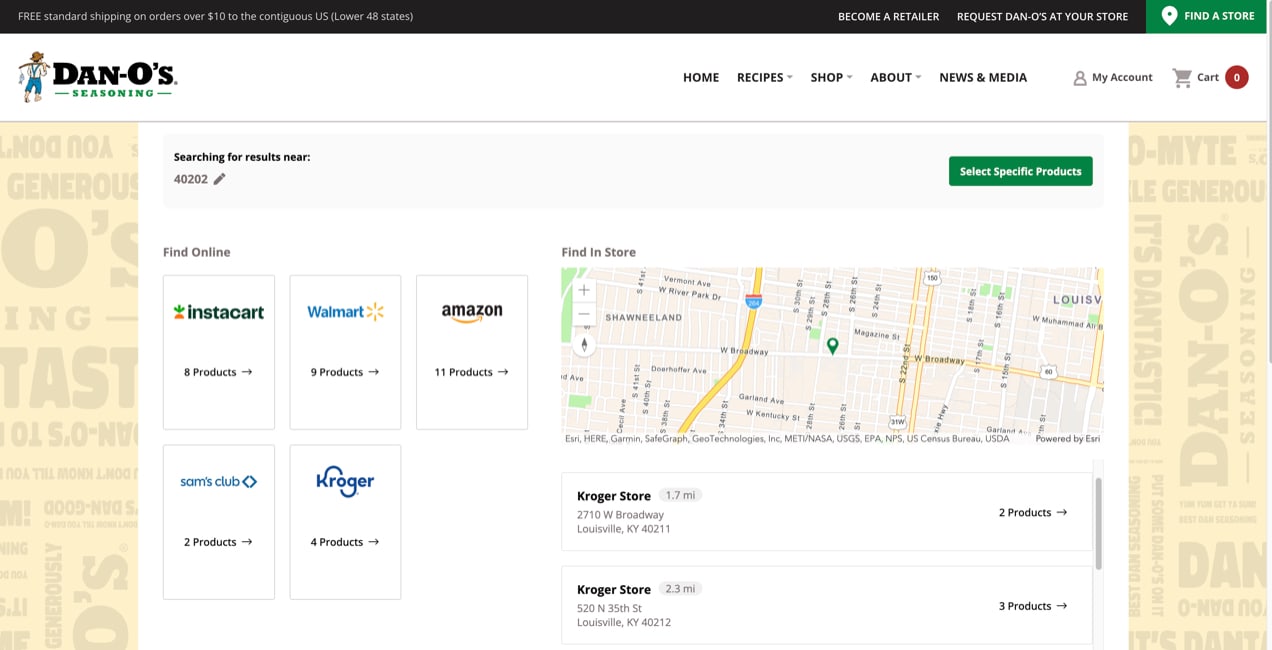Dan-O’s Seasoning makes all-purpose herb and spice blends that simplify cooking and make food taste great. Dan-O’s large-scale multichannel strategy includes a Woo website, Amazon and Walmart marketplaces, 40,000 third-party retail locations, and TikTok, among other social platforms.
When the Covid19 pandemic hit, Dan-O’s Seasoning was a small business — Dan himself would travel to road shows to sell homemade batches of his seasoning. As everything shut down, Dan knew he had to pivot. Around the same time, he’d recently gotten into TikTok, and decided to post cooking videos of recipes using his seasoning.

His videos quickly took off, and his business expanded. Dan-O’s is now headquartered in Louisville, Kentucky, with a team of 50 and manufacturers spread across the U.S. With TikTok and Woo helping fuel their success, Dan-O’s has established a successful multichannel business that continues to grow.
“Dan will tell you himself, he believed in the product from day one but he does credit TikTok for getting the jump to where we are now.”
Nick Neal, Social Media Coordinator
Featured extension: TikTok for WooCommerce
Industry: CPG/Food
Use case: Multichannel ecommerce
Previous platform: Shopify
Highlights:
- Capitalized on their TikTok engagement and a multichannel selling strategy to grow from a small, local business to a household name in less than three years.
- Reached 4M TikTok followers and over 4,000 monthly orders on their Woo store.
- Added 40,000 third-party retail locations to their distribution within the past 18 months.
- Uses their Woo store to launch and validate new products before deciding on retail distribution.
TikTok: Integral from the start
↑ Volver al principioDan-O’s Seasoning began as a one-man show. Dan Oliver created his seasoning blends in his home kitchen and would travel to state fairs and trade shows to sell his product. When the pandemic hit, Dan started a TikTok account that would eventually turn his small batch seasoning into a nationally distributed product. As his videos gained traction, his ecommerce sales increased, and the Dan-O’s Seasoning brand grew into what it is today — on the shelves of major U.S. retailers like Walmart.
Woo and TikTok chatted with Ryan Fertig, Senior Marketing Activation Director and Eli Glancy, eCommerce Growth Manager at Dan-O’s to learn more about their journey and growth strategies.
Settling into ecommerce with Woo
↑ Volver al principioDan-O’s didn’t launch their business with WooCommerce. They started with a homegrown website and switched to Shopify. However, they found that Shopify couldn’t support customization within the checkout process that they needed to scale their business — and was slowing down their site speed.
Dan-O’s worked quickly to find an agency that could help them achieve the level of customization they needed. The agency was established in using WordPress, and their developers recommended WooCommerce as the best solution for Dan-O’s needs.
“We did use Shopify temporarily, and it just didn’t match with the checkout process that we needed to have at the time, or the speed at which we needed it to perform.”
Ryan Fertig, Senior Marketing Activation Director at Dan-O’s Seasoning
The Dan-O’s team also prioritized integrations when building their Woo site, using WordPress’ flexibility to their advantage.
“WooCommerce allowed us to go from something as simple as we needed in the beginning to a full size, customizable site. It gave us the flexibility that we wouldn’t get with Shopify or another platform.”
Meeting customers where they are with multichannel ecommerce
↑ Volver al principioWhile Dan-O’s website is their only direct-to-consumer channel, they do the majority of their business across multiple channels. Dan-O’s Seasoning is available on marketplaces like Amazon and Walmart, at in-person retailers (which can be found via their store locator), and online through third-party retailers.

This multichannel ecommerce strategy allows them to meet customers where they are, fitting Dan-O’s into shoppers’ regular grocery habits.
As a natural evolution of their popularity on TikTok, Dan-O’s is currently exploring how TikTok Shop — now available in select countries with the TikTok for WooCommerce extension — can enhance their TikTok presence. The extension helps Dan-O’s keep their product catalog up to date with a constantly-updating product feed, which allows them to connect their website to TikTok in a seamless experience.
Dan-O’s recipes for success
↑ Volver al principioDan-O’s Seasoning’s fast growth was not coincidence or algorithm luck — there’s a lot that Dan-O’s has done exceptionally well.
Building an audience on Amazon
Dan-O’s has been multichannel from the start of their ecommerce journey, leaning into Amazon in the early days:
“Amazon was honestly a crucial part of our business for the first couple years. In order to even start this business, Amazon was key in allowing us to get those sales. If you look on our Amazon, we’re the number one bestseller in three different categories. All of our products have thousands of reviews. It’s a pretty crucial part of our business, and it was for a really long time.”
Eli Glancy, eCommerce Growth Manager at Dan-O’s Seasoning
Getting social on TikTok

While Dan’s video production quality may have leveled up, the content has stayed genuine and true to his personality. Dan-O’s videos showcase original recipes, are often unscripted, and are varied enough to appeal to a broad audience — all while showing viewers how great their products are.
“Dan-O’s is for everyone. So, when we’re approaching any awareness campaign, we have that in mind and try to consider audiences that we might not have touched on in the past.”
Eli Glancy, eCommerce Growth Manager at Dan-O’s Seasoning
Prioritizing relationships over transactions
When Dan-O’s partners with other content creators, they focus less on the business transaction, and more on the relationships with the people who are using their products. The Dan-O’s team focuses on content that feels organic for the audience, so that even when influencers post an ad, it still feels like a typical organic post.
Focusing on engagement
When measuring both their own posts and their influencers’ posts, the Dan-O’s team looks at engagement numbers rather than total views or followers. They look for influencers who reflect their business values: relating to their customers on a personal level. Dan-O’s social team prioritizes content creators who appeal to specific niches and achieve high engagement within that niche. As a result, Dan-O’s is able to access new audiences that they might not have otherwise reached.
“In terms of creating new content, we are always trying to look at trends and see what other creators are doing, and what has worked well for us in the past to emulate that in future videos. We also look at certain videos that may have received less engagement to see what things went wrong there, and what ways we can improve for future videos.”
Eli Glancy, eCommerce Growth Manager at Dan-O’s Seasoning
Dan-O’s team also engages their fanbase and gets recipe ideas from their large Facebook group. A highlight for the team? Gordon Ramsey dueting their Chub Wellington TikTok.
Directing social viewers to their website
Dan-O’s is strategic in the way they use their profile links and calls to action (CTAs). They’ll often point people directly to their website, where customers can purchase products, or find a retailer that carries Dan-O’s Seasoning. When they run campaigns, they also prioritize driving website traffic because the cost of selling is lower than it would be on a marketplace. Dan-O’s also publishes recipes on their website to continue to provide value, even after a purchase decision is made.
Offering a free shipping threshold to boost conversion
“Before, our shipping was prohibitive because customers would compare the product plus shipping to the price of the product in store,” Ryan noted. So to boost online sales, the team implemented a purchase threshold for free shipping. The threshold improved conversion rates and increased their total number of orders.
Integrating inventory management
For every online platform that Dan-O’s sells through, they integrate their inventory management through a service called Brightpearl, which automatically syncs order information with WooCommerce. This allows them to avoid having a lot of overstock or having products on backorder.
Looking ahead: Optimizing for the future
↑ Volver al principioDan-O’s is currently working on a site update that will revamp their customer experience. Ryan is eager for the impact that these changes will have: “We want to simplify the way customers find products, so that it’s easier for people to buy. We’re very excited about the flow of the user interface and the checkout process. We feel like it’s next level, and we’re stepping up our game in both design and overall usability.”
The redesign is also shifting Dan-O’s site from a page-building plugin to a fully custom-built site, which they anticipate will improve product pages and significantly improve their site speed.
“Our website has always been something we can rely on, and will continue to be for a long time coming.”
Eli Glancy, eCommerce Growth Manager at Dan-O’s Seasoning
About




